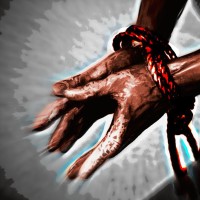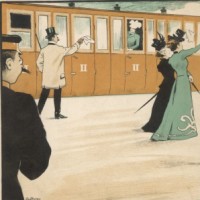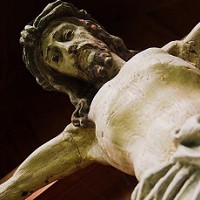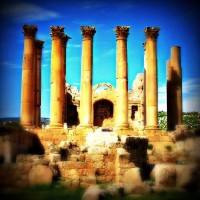Today’s passage is Acts 21:27-36 and it’ll help us to see the bigger picture by reading it and then going back to talk about this Arrested Development.
Acts 21:27 When the seven days were nearly over, some Jews from the province of Asia saw Paul at the temple. They stirred up the whole crowd and seized him, 28 shouting, “Men of Israel, help us! This is the man who teaches all men everywhere against our people and our law and this place. And besides, he has brought Greeks into the temple area and defiled this holy place.” 29 (They had previously seen Trophimus the Ephesian in the city with Paul and assumed that Paul had brought him into the temple area.) 30 The whole city was aroused, and the people came running from all directions. Seizing Paul, they dragged him from the temple, and immediately the gates were shut. 31 While they were trying to kill him, news reached the commander of the Roman troops that the whole city of Jerusalem was in an uproar. 32 He at once took some officers and soldiers and ran down to the crowd. When the rioters saw the commander and his soldiers, they stopped beating Paul. 33 The commander came up and arrested him and ordered him to be bound with two chains. Then he asked who he was and what he had done. 34 Some in the crowd shouted one thing and some another, and since the commander could not get at the truth because of the uproar, he ordered that Paul be taken into the barracks. 35 When Paul reached the steps, the violence of the mob was so great he had to be carried by the soldiers. 36 The crowd that followed kept shouting, “Away with him!”
 No sooner did Paul say last week v 13 Then Paul answered, “Why are you weeping and breaking my heart? I am ready not only to be bound, but also to die in Jerusalem for the name of the Lord Jesus” than God began the process of bringing it about. Paul would not die in Jerusalem though. He’d die years later somewhere in Gentile territory…as a martyr.
No sooner did Paul say last week v 13 Then Paul answered, “Why are you weeping and breaking my heart? I am ready not only to be bound, but also to die in Jerusalem for the name of the Lord Jesus” than God began the process of bringing it about. Paul would not die in Jerusalem though. He’d die years later somewhere in Gentile territory…as a martyr.
But for now, his ministry would experience Arrested Development. A slowing in the growth and maturity of Paul’s ministry there as bearing positive fruit for the Gospel.
At this point, Paul’s ministry highlights something else: that the Gospel cuts both ways.
It inspires faith…and it exposes the faithless.
People these days would rather view the Bible as being nothing but good and loving and God has no wrath and everyone gets along swimmingly without God until we need Him when we can pray and He’s there for us. Jesus loves you just as you are and won’t ask you to change a thing!
But the Gospel inspires faith and exposes the faithless, just like when Jesus explained why He spoke in parables saying, Mark 4:11 He told them, “The secret of the kingdom of God has been given to you. But to those on the outside everything is said in parables 12 so that, “‘they may be ever seeing but never perceiving, and ever hearing but never understanding; otherwise they might turn and be forgiven!'” Or as Paul would later write to the Romans 12:19 Do not take revenge, my friends, but leave room for God’s wrath, for it is written: “It is mine to avenge; I will repay,” says the Lord. 20 On the contrary: “If your enemy is hungry, feed him; if he is thirsty, give him something to drink. In doing this, you will heap burning coals on his head.” 21 Do not be overcome by evil, but overcome evil with good.
Sometimes God gives us good preaching and good teaching to grow our Christian maturity, but wait. The truth is that sometimes it’s to further drive the nail in the coffin, so to speak.
It reveals and seals the hardness of someone’s heart.
So too, here with Paul, he’s showing up in Jerusalem preaching and next week he’ll retell his conversion story…and all the while you can hear the nails going into the coffin lid of those who this week are rioting and arresting Paul. A few may yet be saved, but overall, there’s a change. The Gospel is exposing and sealing their unbelief.
Paul had, at the suggestion of the Jerusalem brothers (James and all the elders) had participated in the purification rites as evidence of his purity as a Jew and his adherence to the Law. It was nice in theory, but failed in practice because today we read,
Acts 21:27 When the seven days were nearly over, some Jews from the province of Asia saw Paul at the temple. They stirred up the whole crowd and seized him, 28 shouting, “Men of Israel, help us! This is the man who teaches all men everywhere against our people and our law and this place. And besides, he has brought Greeks into the temple area and defiled this holy place.” 29 (They had previously seen Trophimus the Ephesian in the city with Paul and assumed that Paul had brought him into the temple area.)
People assumed that Paul had done something offensive and in-their-faces because it’s what they wanted to believe. They wanted to believe the rumor that Paul was teaching against the Law of Moses just like Paul (Saul) had done with Stephen. And you know what? Paul’s going along with those purification rites last week meant nothing to them.
They saw what they wanted to see. Paul is a problem.
They believed what they wanted to believe.
Paul is teaching lies.
If you stop and think about it, human nature is no different today. If you look at the sphere of politics, people believe what they want to believe. Illegal immigration: a problem or an opportunity? Planned Parenthood funding: a problem or a societal good? The refugees flooding Europe and coming here too: the infiltration, influx and takeover of the West by Islamic young men of fighting age and a real problem or a vastly needed help for a totally humanitarian cause? The list goes on and on and we’d hear it over and over again in the debates if we focused on issues instead of who-said-what-to-whom and who has a face only a mother could love.
How about in the Church? People believe what they want to believe and they will go to churches (or avoid going to churches) in order to hear their own beliefs affirmed. Do you know people who will stop going to a church because they don’t want to hear some stupid pro-life, born-again message? Maybe they don’t want to ruin their Sunday by going to hear some hypocrite preaching at them? Or do you know people who will stop going to a church because there is some woman who is the Bible teacher there? I do. It happens all the time. Over more than just women, too. Way too many people choose churches that preach what they want to hear. And the Bible foretells that: 2 Timothy 4:3 For the time will come when men will not put up with sound doctrine. Instead, to suit their own desires, they will gather around them a great number of teachers to say what their itching ears want to hear.
- Creation: is it as the Bible talks about as a miracle or something science refutes?
- Sexual immorality: a sin or just another way the Bible is out of touch with modernity?
- Marriage: between a man and a woman or is the Bible stuck back in a less enlightened era?
- Pro-life: biblical…or just another way Christian zealots are trying to strip women of their rights and for men to exert their dominance by keeping women barefoot, pregnant and wearing denim jumpers?
Human nature doesn’t respond to facts as well as one would like to think.
To justify our own position, we question the source. We look for a consensus among people we trust to believe and affirm what we already believe. We look at who supports it and make judgment calls based on superficial things: gender, color of skin, style of hair, size of nose, where someone went to school, how much money they make, where they work, etc. We are moved less by facts than by opinion—we’re preoccupied with photos and sound bytes; we’re sold on spin; and get a hodge-podge of half-truths that someone else wants us to believe. Oh, we probably suspect it’s all staged, but it’s ok because we already believe it too.
Do you know people…maybe on Facebook, in school, at work, over email or at family gatherings…that you know you have to avoid because they never let inconvenient facts get in the way of their asserting what they believe? Oftentimes in a loud and angry way. I’ve been unfriended on Facebook by such people.
But it doesn’t mean we should stop seeking and speaking the truth!
What did this mean for Paul? He wasn’t about to abandon the truth. Persecution was bound to happen. Agabus the prophet last week confirmed that this would be the result of Paul’s truth-telling.
30 The whole city was aroused, and the people came running from all directions. Seizing Paul, they dragged him from the temple, and immediately the gates were shut.
Throw the bum out. Get that infidel out of the temple. Shut him out and shut him down!
31 While they were trying to kill him, news reached the commander of the Roman troops that the whole city of Jerusalem was in an uproar. 32 He at once took some officers and soldiers and ran down to the crowd. When the rioters saw the commander and his soldiers, they stopped beating Paul.
The only thing the “Men of Israel” feared more than good and convincing preaching by a passionate and powerful Christian like Paul…was the Roman authority which had the power to shut the Temple down politically and cut their income stream off significantly. The “Men of Israel” stopped beating Paul to keep from being shut down themselves by those they feared more.
Which, think about it: If they feared God more than the authorities and if they were right, why didn’t they fight to keep on beating Paul, that “infidel”? If God’s honor was at stake? That’s what ISIS does. They kill people who don’t follow their religious teachings. Apparently the authorities–in Iraq and Syria–aren’t keen to get in the way of their religious teachings with the result of having their severed heads on a pole as a warning.
Maybe when people hold to a convenient idea based upon only half-truths, their actions reveal something deeper than their words: whether they truly consider it a hill to die on. I’d like to think that God’s character (His authority, His holiness and His sovereignty) would be a hill to die on. Worth being imprisoned for. And a person would be willing to die to protect the right to believe it. Paul was willing to be bound and to die for what he believed. Why not the “Men of Israel”…if they truly believed…?
33 The commander came up and arrested him and ordered him to be bound with two chains. Then he asked who he was and what he had done.
My, how things have changed! If that’d happened in the US… in that order, the commander would be on trial in many US cities. Arresting the guy being beaten by a mob, putting chains on him, and then asking what he’d done. Yikes. That commander would probably be put away for life.
But it kept the crowd from killing Paul so it was actually a good development. Even if it was arrested development for Paul’s evangelistic ministry.
34 Some in the crowd shouted one thing and some another, and since the commander could not get at the truth because of the uproar, he ordered that Paul be taken into the barracks.
The commander asked who he was and what he was doing…but then who answers? The crowd was doing a shout-out like Cash Cab’s evil twin. The commander and Paul didn’t even place a call and suddenly everyone else is shouting out answers. Paul gets hauled off to the prison barracks and is willing to go there of his own accord. But…
35 When Paul reached the steps, the violence of the mob was so great he had to be carried by the soldiers. 36 The crowd that followed kept shouting, “Away with him!”
Might as well have been “Crucify him!”
That’s what this same belief-set did to Jesus. People believe what they want to believe. If you can’t shut’em up, and you can’t shut’em down…then shut’em out. Away with him!
Have you ever been shut out?
I have. Frequently. One of the reasons I’ve been so grateful to be here among you during the past year is that I’m shut out a lot. It’s not easy being female in my profession.
Ironically, I’ve had a whole bunch of people reading through my old sermons online during the past year. I told my husband about that the other day and his first question was “Is someone plagiarizing them? Stealing your sermons and preaching them as if they’re his?” I said, “It’s quite probable.” Then he said, “It’s terrible that this is my first thought.” My response floored him: I said that I’m used to it. It’s been happening a long time, ever since my words have gone on the Internet 20 + years ago and even before I was a Christian. If some man teaches or preaches what I wrote, maybe not word for word, but close enough that it quacks like a duck…but if lives are changed, then you know what? I’m happy about it. Why? Because there are people out there that would shut out my physical person who would yet welcome every word of the message I preach.
I’d rather have them get the message. The message is that important.
The message saves. The message that Jesus is the Messiah, He is our Savior, there is no heaven without Him, there is no eternal life if He’s not the source of it, there is no forgiveness apart from Him, and also the uncomfortable Gospel truth that Jesus doesn’t save everyone. He wants to save everyone, but some have such hard hearts that they don’t want it. They only believe what they want to believe. They have the real arrested development—never getting out of their man-centered mindset; never willing to trust Christ with their lives; never willing to lay down their pride and admit that they can’t save themselves; and never knowing the freedom that happens when we admit we aren’t gods and the universe doesn’t spin around us.
Paul’s ministry—as an arrested development from a freedom standpoint—was not arrested development from a message standpoint.
His message of the Gospel truth was a hill to die on and it’s from prison that Paul would write some of the letters we have recorded as our NT. From here forward, Paul is not a free man with any regularity. He’s most often a prisoner, sometimes under house arrest, and one can only imagine that he would develop much of his understanding of the “bondage of sin” theology from his various times in custody.
The letter to the Philippians is one such prison letter. Philippians 3:4b If anyone else thinks he has reasons to put confidence in the flesh, I have more: 5 circumcised on the eighth day, of the people of Israel, of the tribe of Benjamin, a Hebrew of Hebrews; in regard to the law, a Pharisee; 6 as for zeal, persecuting the church; as for legalistic righteousness, faultless. 7 But whatever was to my profit I now consider loss for the sake of Christ. 8 What is more, I consider everything a loss compared to the surpassing greatness of knowing Christ Jesus my Lord, for whose sake I have lost all things. I consider them rubbish, that I may gain Christ 9 and be found in him, not having a righteousness of my own that comes from the law, but that which is through faith in Christ– the righteousness that comes from God and is by faith. 10 I want to know Christ and the power of his resurrection and the fellowship of sharing in his sufferings, becoming like him in his death, 11 and so, somehow, to attain to the resurrection from the dead. 12 Not that I have already obtained all this, or have already been made perfect, but I press on to take hold of that for which Christ Jesus took hold of me. 13 Brothers, I do not consider myself yet to have taken hold of it. But one thing I do: Forgetting what is behind and straining toward what is ahead, 14 I press on toward the goal to win the prize for which God has called me heavenward in Christ Jesus. 15 All of us who are mature should take such a view of things. And if on some point you think differently, that too God will make clear to you.
For Paul, the arrested development in today’s passage—his being arrested and losing his freedom—opened another development with eternal significance. It is through his letters in our written record–the Bible—that Truth rolls on like a mighty river, true justice rolls on in Christ. Paul’s view was a good one. For he said in his prison letter to the Philippians 1:21 For to me, to live is Christ and to die is gain.
Far from arrested development, that view is the hallmark of Christian maturity.
In today’s passage Paul has been arrested. It’s not a bad development from a Kingdom of God perspective. It inspires faith and exposes the faithless. It inspires pressing on in spite of persecution. It inspires us to live by faith and not by what the world already believes and wants to sell us on. It inspires us to gain that vision heavenward that puts life’s trials in perspective. Not arrested development at all. Rather, it is God’s plan and a hill to die on. To live is Christ…and to die is gain.
 10 After we had been there a number of days, a prophet named Agabus came down from Judea. 11 Coming over to us, he took Paul’s belt, tied his own hands and feet with it and said, “The Holy Spirit says, ‘In this way the Jews of Jerusalem will bind the owner of this belt and will hand him over to the Gentiles.'” 12 When we heard this, we and the people there pleaded with Paul not to go up to Jerusalem. 13 Then Paul answered, “Why are you weeping and breaking my heart? I am ready not only to be bound, but also to die in Jerusalem for the name of the Lord Jesus.” 14 When he would not be dissuaded, we gave up and said, “The Lord’s will be done.”
10 After we had been there a number of days, a prophet named Agabus came down from Judea. 11 Coming over to us, he took Paul’s belt, tied his own hands and feet with it and said, “The Holy Spirit says, ‘In this way the Jews of Jerusalem will bind the owner of this belt and will hand him over to the Gentiles.'” 12 When we heard this, we and the people there pleaded with Paul not to go up to Jerusalem. 13 Then Paul answered, “Why are you weeping and breaking my heart? I am ready not only to be bound, but also to die in Jerusalem for the name of the Lord Jesus.” 14 When he would not be dissuaded, we gave up and said, “The Lord’s will be done.”
 Compelled. It’s time. It’s time for good-bye.
Compelled. It’s time. It’s time for good-bye. But the picture that continues to haunt me is the one on the front of the bulletin this week
But the picture that continues to haunt me is the one on the front of the bulletin this week  The Gospel is special in the way it encourages.
The Gospel is special in the way it encourages.  Ephesus would be a special place for Paul.
Ephesus would be a special place for Paul. What can we learn from this vignette? We all start somewhere. No one arrives from the womb with complete Bible knowledge. We all start somewhere and it’s not a sign of shame or stupidity to have incomplete faith. But it is important that we don’t become content with incomplete faith and rob ourselves of the power of the Spirit-filled life. Repentance of John’s baptism is where it starts, but in Christ Jesus, forgiveness is here and personal. The Holy Spirit is the same evidence here among the Gentiles as He was at Pentecost among the Jews and God-fearers present at that time. Were Peter and the other disciples believers before the Holy Spirit came at Pentecost? Sure! But the Holy Spirit sealed it, just like here. We all start somewhere.
What can we learn from this vignette? We all start somewhere. No one arrives from the womb with complete Bible knowledge. We all start somewhere and it’s not a sign of shame or stupidity to have incomplete faith. But it is important that we don’t become content with incomplete faith and rob ourselves of the power of the Spirit-filled life. Repentance of John’s baptism is where it starts, but in Christ Jesus, forgiveness is here and personal. The Holy Spirit is the same evidence here among the Gentiles as He was at Pentecost among the Jews and God-fearers present at that time. Were Peter and the other disciples believers before the Holy Spirit came at Pentecost? Sure! But the Holy Spirit sealed it, just like here. We all start somewhere. manufacturing shrines and souvenirs. Their whole tourism industry was built around the temple of Artemis of the Ephesians! If worship stopped there, if the prostitution stopped there, if the tourism stopped there, if the silver smiths stopped their work, the whole economy of Ephesus could collapse as lose its status as a center of culture and trade. It wouldn’t be too good financially for any of the people who profited from it. So they rioted. They formed a mob and went into the streets. Picture the riots in Detroit in 1967 or the
manufacturing shrines and souvenirs. Their whole tourism industry was built around the temple of Artemis of the Ephesians! If worship stopped there, if the prostitution stopped there, if the tourism stopped there, if the silver smiths stopped their work, the whole economy of Ephesus could collapse as lose its status as a center of culture and trade. It wouldn’t be too good financially for any of the people who profited from it. So they rioted. They formed a mob and went into the streets. Picture the riots in Detroit in 1967 or the